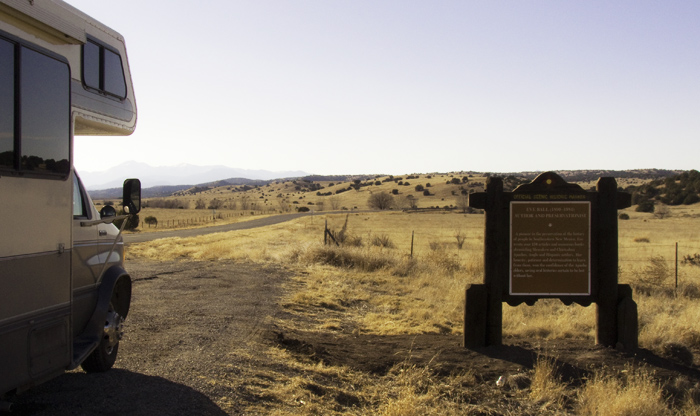Friday, December 18, 2009 - Fort Stanton Cave Campground, Lincoln NM
< previous day | archives | next day >

Eve Ball roadside marker, Lincoln NM, December 18, 2009
Today I planned to head up to Valley of Fires Recreation Area, Carrizozo NM. I never made it. I got waylaid by the jaw-dropping beauty of the rolling desert and grasslands along US 380 between Roswell and Carrizozo NM. I stopped to see what this Eve Ball roadside marker was all about and discovered I could camp right here.
With a little Googling (oh, how I do love this modern technology that lets me Google way out here!) I discovered the forest road across from the marker leads into the new Fort Stanton-Snowy River Cave National Conservation Area and up to the Fort Stanton Cave, the third largest cave in New Mexico. And a tiny little 3 site campground just beyond the entrance to the cave. Well, gee, this was just too good to pass up!
New Mexico State Parks News Release (pdf) issued December 17th, 2009
Contrary to a hearsay report I got this morning, the New Mexico State Parks will be closed December 24th which means no camping will be available in the park system the nights of December 23 and 24.
Official Scenic Historical Marker: Eve Ball (1890 - 1984)
AUTHOR AND PRESERVATIONIST
A pioneer in the preservation of the history of people in southeastern New Mexico, Eve wrote over 150 articles and numerous books chronicling Mescalero and Chiricahua Apaches, Anglo and Hispanic settlers. Her honesty, patience and determination to learn from them, won the confidence of the Apache elders, saving oral histories certain to be lost without her.
Night camp
Primitive Campground at Fort Stanton Cave, Lincoln NM
- This is a primitive campground with three sites and a single pit toilet.
- Verizon cell phone and Broadband service is good.
- Fort Stanton-Snowy River Cave National Conservation Area info
- Locate Fort Stanton Cave Campground on my Night Camps map
- Check the weather here
Roses
Out by the road on the far side of the house is a wild rose bush. It's mostly thorns. We never water it or cut it back. It just lives on its own. It makes tiny yellow roses that never relax. I think the buds know that opening up is the beginning of the end.
The Box Children, Sharon Wyse